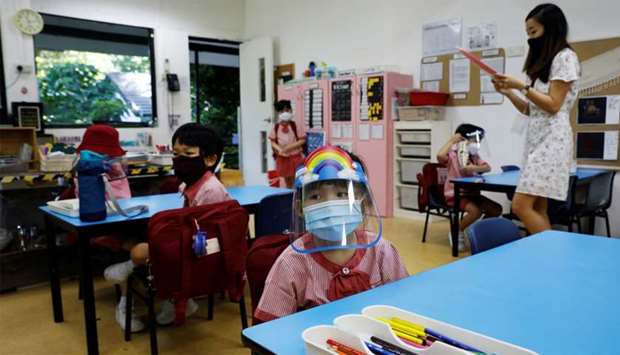Singapore on Tuesday began allowing activities that ‘do not pose high risk of transmission’ to resume after two months of lockdown, despite reporting the second-highest number of coronavirus cases in East Asia.
Some offices and factories resumed operations, children went back to school, while places of worship began to open their doors.
Singapore's Prime Minister Lee Hsien Loong said on Monday that the relaxation will likely prove ‘a big relief to all’ but one that is ‘certainly not without its risks.’ The tiny but wealthy city-state, an investment and trade hub whose seaport and airport rank among the world's busiest, has diagnosed 35,292 cases of the new coronavirus, more than any country in East or South-East Asia except for China.
Most of the cases are among foreign migrants confined to dormitories, though the related death toll, at 24, is one of the world's lowest.
Pledging that the government would build new residences to house up to 100,000 of the roughly 320,000 migrants who sleep sometimes 10-20 to a room, National Development Minister Lawrence Wong described the situation at the dormitories as ‘under control’ on Monday.
With new daily cases of the virus among Singaporeans down to single figures most days over the past week, the government opted to stick to the scheduled phased winding down of restrictions from June 1.
‘More patients have now recovered and been discharged, than are still receiving care,’ Lee said.
Some restrictions will remain for several more weeks. Restaurants cannot yet cater to dine-in customers and recreation facilities such as gyms and cinemas cannot yet reopen.
Some places of worship will not reopen despite having permission to do so. The Catholic Archdiocese of Singapore said it would delay reopening churches due to curbs on deploying volunteers. The Islamic Religious Council of Singapore said that 64 mosques would allow up to 5 people to pray for up to 20 minutes, in keeping with the looser restrictions.
Singapore's open economy looks set to be hit hard by the pandemic and lockdowns.
The government last week predicted a contraction of up to 7 per cent in 2020 - before announcing that it would increase spending aimed at curbing pandemic impacts to almost a fifth of gross domestic product.
Several of Lee's cabinet said that despite Tuesday's easing of restrictions, people in Singapore would have to get used to a ‘new normal’ - a slogan that leaders around the world are echoing to refer to changes to daily life perceived as necessary to reining in the pandemic - unless a vaccine is created.
Even if a vaccine is made available, Lee warned on Monday, ‘everything will not simply go back to the way it was before.’

